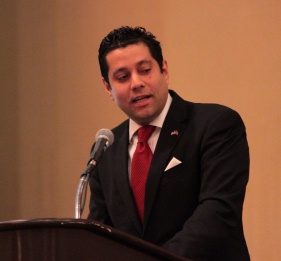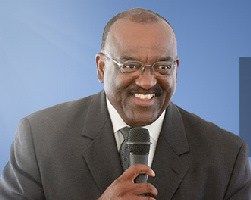The Day After Tomorrow – The Implications of the US Presidential Elections on Trinidad and Tobago
Commentary by H.E. Dr. Neil Parsan, Ambassador of Trinidad and Tobago to the United States of America
WASHINGTON, DC – Amid a global climate of worrying economic uncertainty, widening social and gender inequality and growing cries for self-determination, the world awaits the results of the US presidential elections.
As it stands the total projected electoral vote for President Obama, 186 solid and 57 electoral votes leaning. For Mitt Romney the projection stands at 177 solid and 36 leaning.
To occupy the Oval Office the candidate must secure 270 electoral votes therefore President Obama needs at least 27 and Mitt Romney at least 64 electoral votes. With Florida [29], Ohio [18], Colorado [9], Wisconsin [10], [6], Nevada [6] and Virginia [13] still classified as toss-up states, the race remains wide open.
President Obama and Mitt Romney stand on different sides of the isle when it comes to their respective visions for the United States. On some issues no clear articulation of a plan to mitigate some of the challenges has not been offered.
The key issues that defines this election include but is not limited to:
• the economy/jobs
• healthcare
• foreign policy
• energy
• immigration
• education
The economy/jobs
On this issue President Obama advocates tax breaks for companies that keeps jobs in the United States and penalty for firms that move them abroad. The president also stated he would dramatically cut domestic spending including defense spending. Gov. Romney proposed to reduce the corporate tax rate from 35% to 25% and limit federal spending. He also suggested reducing domestic spending by 5%. The nation’s employers added 171,000 positions in October, the Labor Department reported Friday, and more jobs than initially estimated in August and September.
A stimulated United States economy has global implications. Director and indirect employment would also have a direct impact on the level of remittances entering the region including Trinidad and Tobago.
Healthcare
President Obama enacted the 2010 Affordable Care Act which would extend coverage to an additional 30 million Americans. He opposes Gov. Romney’s proposal to turn Medicaid into a block grant and he is a strong supporter of abortion rights. Gov. Romney proposes to repeal President Obama’s law and plans to overhaul Medicaid in a manner that sees states receiving block grants from the federal government. He believes that states should create their own policies to deal with the uninsured. He also proposes to cut federal funding for Planned Parenthood and is against abortion rights.
Both approaches to the healthcare debate will have implications for the extent of coverage as well as the access to quality of providers for Nationals of Trinidad and Tobago.
Foreign policy
During this four-year term President Obama has ended the war in Iraq, ordered the killing of Osama bin Laden, ordered the withdrawal of troops from Afghanistan by 2014 and promised that Iran would not acquire nuclear weapons. President Obama has also supported Democratic change in the Middle East but has been criticized for his lack of intervention in Syria and more recently the administration’s handling of the incident in Benghazi, Libya. Gov. Romney has suggested arming the opposition in Syria and more recently has been agreeing to some extent of the present administration’s foreign policy.
Whichever candidate secures the presidency, the administration’s foreign policy has global implications that will resonate to the Latin America and Caribbean region. Very little has been said during the presidential debates and during the Democratic National Congress and Republican National Congress as it pertains to the Caribbean. Notwithstanding however on isolated occasions, mention has been made of the Latin American and Caribbean region.
The present administration’s approach to foreign policy has been one of finding pragmatic solutions and consensus building. Time was spent during the last four years to strengthen selected relationships. The recent future has seen United States playing a more stabilizing role in the Asia Pacific region and recalibrating its military posture there.
China
Attempts were made to work cooperatively with China and as President Obama suggested to integrate into a rules-based order. It was suggested during the campaign trail that the United States relationship with China depends on ‘how’ China decides to rise. It is also evident that China’s economic growth depends on the integrative model adopted by China itself. The outsourcing of jobs to China became a presidential debate hot topic.
Middle East
The present administration suggested that it will not lose focus when it comes to this region. As quoted by a government official ‘the Middle East is in the first pages of the first chapter of a very long book. The pen is in the hand of the Arab people.’ The greatest challenge to any incoming president will be preventing the acquisition of nuclear weapons by Iran, not allowing Iran to continue its destabilizing efforts and restoring Syria to stability and order.
Israel
Both presidential candidates reiterated the commitment of the United States to the peace process. President Obama specifically urged Israel not to launch a unilateral attack on Iran’s nuclear facilities instead favoring sanctions and diplomatic pressure.
Egypt
Both presidential candidates express their willingness to welcome the new government and their commitment to the economy of Egypt.
European Union
President Obama reiterated his administration’s focus on the European Union and their continued engagement with this region. He expressed his determination and hope that the European Union will break the present impasse and come out of its political paralysis.
Africa
The present administration expresses great concern of terrorism in the southern region of Africa. The United States has been assisting in building capacity in the region and assisting with tactics that avoidant terrorist groups getting traction with local populations. The present administration suggested its commitment to further trade and relationship building with the growing economies of Africa.
Latin America and the Caribbean
Little mention has been made of the Caribbean region. Both candidates during the campaign trail express their commitments to the larger economies of Latin America including Brazil, Mexico and Colombia.
During a recent meeting with the administration and the diplomatic corps a question was raised by the Ambassador of the Dominican Republic to the United States as it pertains to the embargo on Cuba.
The response suggested that a review of the end of the embargo will be undertaken should president Obama retain office and the government official reiterated its commitment in facilitating the flow of people.
A question was also asked by the Ambassador of the Republic of Trinidad and Tobago has it pertains to the existing relationship between the United States and Venezuela. This is especially more relevant given the fact that Hugo Chavez retained the presidency in Venezuela recently.
The response indicated that no change in posture should be anticipated should President Obama retain office. Engagements with Western hemispheric multilateral bodies including the organization of American states (OAS) are expected to the forum in which such issues are discussed.
Energy
President Obama did not support the Keystone XL pipeline proposal and favors opening new offshore areas for oil and gas exploration. He further proposes to cut United States or oil imports by 33% by 2020. He supports investing in renewable energy. Gov. Romney said he would approve the Keystone XL pipeline and would open up on federal land for oil and gas exploration. He opposes the present administration’s strategy for investing in green technology.
Further gas exploration in the United States posturing to become net exporters of gas will suggest that Trinidad and Tobago needs to continue its approach in soliciting nontraditional export markets for its gas.
Continued dialogue with global stakeholders in bodies such as the recently inaugurated Global Gas Council chaired by the Ambassador of Trinidad and Tobago in Washington DC should be encouraged.
Immigration
President Obama urged Congress to pass the Dream Act which would give young illegal immigrants a path to citizenship if they attend college or service in the military. This bill was blocked by the Senate.
The administration said it will grant a two year work permit and the deferral of deportation to young illegal immigrants who arrived as children, are students or veterans, and meet certain other conditions.
President Obama vowed to continue his focus on deporting criminals and recent arrivals. Gov. Romney suggested that illegal immigrants should ‘self deport’. He opposes providing illegal immigrants with any form of ‘amnesty’ or incentives such as driver license, jobs and college tuition.
Nationals of Trinidad and Tobago are expected to benefit from the two-year work permit and the deferral of deportation.
Education
President Obama opposes using public tax money to pay tuition at private schools. A $5 billion stimulus was used to create a Race to the Top in order to encourage states to achieve national standards in education.
An overhaul was done on the student loan industry. Gov. Romney supports the use of tax money to pay for tuition at private schools. He suggests that states should have more autonomy when it comes to educating children.
The education policies of the United States would inevitably impact on the global economy. Many countries such as Nigeria, Israel and India have experienced a net ‘brain gain’ by the educated nationals contributing financially and intellectually to the development of the homelands. This may be true for Trinidad and Tobago in time as policies are operationalized.
Business as usual for Trinidad and Tobago?
Regardless of who secures the presidency, the relationship between Trinidad and Tobago and the United States is expected to be one of continued strength, longevity and cordiality. It is expected that we will continue to engage our partners in established areas of cooperation such as an energy and security.
It is expected that we will continue to honor our commitments and agreements including agreements in double taxation, air services, bilateral investments, maritime cooperation, intellectual property and open skies.
Both countries should look forward to operationalizing several US Caribbean initiatives including expanding academic exchanges through the 100,000 strong initiative, the International Diaspora Engagement Alliance and giving further traction from the Women’s Leaders Colloquim led by the Hon. Prime Minister of Trinidad and Tobago, Kamla Persad-Bissessar.
We should also look forward to further strengthening the many joint initiatives undertaken by both countries.
These include cultural exchanges, the YTEPP-USAID partnership, Open Government partnership, operationalizing the Renewable Energy Research Center among others.
There are challenges that we must face hand-in-hand. The issue of deportees, narco trafficking and the issuance of visas to the United States facilitates continued dialogue.

Dr. Neil Parsan
Ambassador to the United States, Mexico and the OAS


